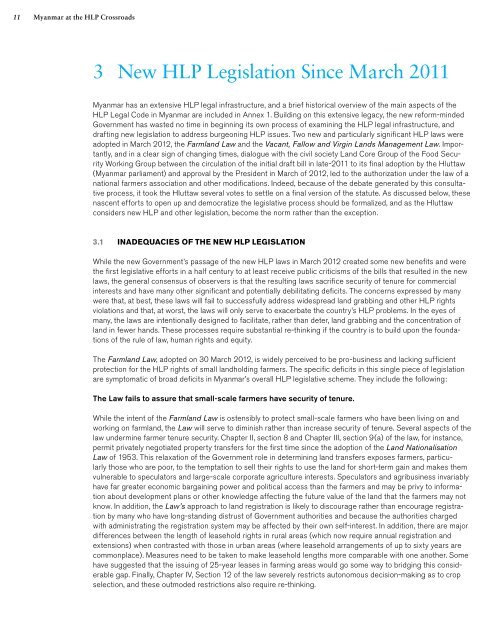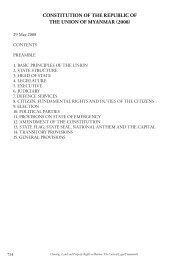Myanmar at the HLP Crossroads: - Displacement Solutions
Myanmar at the HLP Crossroads: - Displacement Solutions
Myanmar at the HLP Crossroads: - Displacement Solutions
You also want an ePaper? Increase the reach of your titles
YUMPU automatically turns print PDFs into web optimized ePapers that Google loves.
11<strong>Myanmar</strong> <strong>at</strong> <strong>the</strong> <strong>HLP</strong> <strong>Crossroads</strong>3 New <strong>HLP</strong> Legisl<strong>at</strong>ion Since March 2011<strong>Myanmar</strong> has an extensive <strong>HLP</strong> legal infrastructure, and a brief historical overview of <strong>the</strong> main aspects of <strong>the</strong><strong>HLP</strong> Legal Code in <strong>Myanmar</strong> are included in Annex 1. Building on this extensive legacy, <strong>the</strong> new reform-mindedGovernment has wasted no time in beginning its own process of examining <strong>the</strong> <strong>HLP</strong> legal infrastructure, anddrafting new legisl<strong>at</strong>ion to address burgeoning <strong>HLP</strong> issues. Two new and particularly significant <strong>HLP</strong> laws wereadopted in March 2012, <strong>the</strong> Farmland Law and <strong>the</strong> Vacant, Fallow and Virgin Lands Management Law. Importantly,and in a clear sign of changing times, dialogue with <strong>the</strong> civil society Land Core Group of <strong>the</strong> Food SecurityWorking Group between <strong>the</strong> circul<strong>at</strong>ion of <strong>the</strong> initial draft bill in l<strong>at</strong>e-2011 to its final adoption by <strong>the</strong> Hluttaw(<strong>Myanmar</strong> parliament) and approval by <strong>the</strong> President in March of 2012, led to <strong>the</strong> authoriz<strong>at</strong>ion under <strong>the</strong> law of an<strong>at</strong>ional farmers associ<strong>at</strong>ion and o<strong>the</strong>r modific<strong>at</strong>ions. Indeed, because of <strong>the</strong> deb<strong>at</strong>e gener<strong>at</strong>ed by this consult<strong>at</strong>iveprocess, it took <strong>the</strong> Hluttaw several votes to settle on a final version of <strong>the</strong> st<strong>at</strong>ute. As discussed below, <strong>the</strong>senascent efforts to open up and democr<strong>at</strong>ize <strong>the</strong> legisl<strong>at</strong>ive process should be formalized, and as <strong>the</strong> Hluttawconsiders new <strong>HLP</strong> and o<strong>the</strong>r legisl<strong>at</strong>ion, become <strong>the</strong> norm r<strong>at</strong>her than <strong>the</strong> exception.3.1 INADEQUACIES OF THE NEW <strong>HLP</strong> LEGISLATIONWhile <strong>the</strong> new Government’s passage of <strong>the</strong> new <strong>HLP</strong> laws in March 2012 cre<strong>at</strong>ed some new benefits and were<strong>the</strong> first legisl<strong>at</strong>ive efforts in a half century to <strong>at</strong> least receive public criticisms of <strong>the</strong> bills th<strong>at</strong> resulted in <strong>the</strong> newlaws, <strong>the</strong> general consensus of observers is th<strong>at</strong> <strong>the</strong> resulting laws sacrifice security of tenure for commercialinterests and have many o<strong>the</strong>r significant and potentially debilit<strong>at</strong>ing deficits. The concerns expressed by manywere th<strong>at</strong>, <strong>at</strong> best, <strong>the</strong>se laws will fail to successfully address widespread land grabbing and o<strong>the</strong>r <strong>HLP</strong> rightsviol<strong>at</strong>ions and th<strong>at</strong>, <strong>at</strong> worst, <strong>the</strong> laws will only serve to exacerb<strong>at</strong>e <strong>the</strong> country’s <strong>HLP</strong> problems. In <strong>the</strong> eyes ofmany, <strong>the</strong> laws are intentionally designed to facilit<strong>at</strong>e, r<strong>at</strong>her than deter, land grabbing and <strong>the</strong> concentr<strong>at</strong>ion ofland in fewer hands. These processes require substantial re-thinking if <strong>the</strong> country is to build upon <strong>the</strong> found<strong>at</strong>ionsof <strong>the</strong> rule of law, human rights and equity.The Farmland Law, adopted on 30 March 2012, is widely perceived to be pro-business and lacking sufficientprotection for <strong>the</strong> <strong>HLP</strong> rights of small landholding farmers. The specific deficits in this single piece of legisl<strong>at</strong>ionare symptom<strong>at</strong>ic of broad deficits in <strong>Myanmar</strong>’s overall <strong>HLP</strong> legisl<strong>at</strong>ive scheme. They include <strong>the</strong> following:The Law fails to assure th<strong>at</strong> small-scale farmers have security of tenure.While <strong>the</strong> intent of <strong>the</strong> Farmland Law is ostensibly to protect small-scale farmers who have been living on andworking on farmland, <strong>the</strong> Law will serve to diminish r<strong>at</strong>her than increase security of tenure. Several aspects of <strong>the</strong>law undermine farmer tenure security. Chapter II, section 8 and Chapter III, section 9(a) of <strong>the</strong> law, for instance,permit priv<strong>at</strong>ely negoti<strong>at</strong>ed property transfers for <strong>the</strong> first time since <strong>the</strong> adoption of <strong>the</strong> Land N<strong>at</strong>ionalis<strong>at</strong>ionLaw of 1953. This relax<strong>at</strong>ion of <strong>the</strong> Government role in determining land transfers exposes farmers, particularlythose who are poor, to <strong>the</strong> tempt<strong>at</strong>ion to sell <strong>the</strong>ir rights to use <strong>the</strong> land for short-term gain and makes <strong>the</strong>mvulnerable to specul<strong>at</strong>ors and large-scale corpor<strong>at</strong>e agriculture interests. Specul<strong>at</strong>ors and agribusiness invariablyhave far gre<strong>at</strong>er economic bargaining power and political access than <strong>the</strong> farmers and may be privy to inform<strong>at</strong>ionabout development plans or o<strong>the</strong>r knowledge affecting <strong>the</strong> future value of <strong>the</strong> land th<strong>at</strong> <strong>the</strong> farmers may notknow. In addition, <strong>the</strong> Law’s approach to land registr<strong>at</strong>ion is likely to discourage r<strong>at</strong>her than encourage registr<strong>at</strong>ionby many who have long-standing distrust of Government authorities and because <strong>the</strong> authorities chargedwith administr<strong>at</strong>ing <strong>the</strong> registr<strong>at</strong>ion system may be affected by <strong>the</strong>ir own self-interest. In addition, <strong>the</strong>re are majordifferences between <strong>the</strong> length of leasehold rights in rural areas (which now require annual registr<strong>at</strong>ion andextensions) when contrasted with those in urban areas (where leasehold arrangements of up to sixty years arecommonplace). Measures need to be taken to make leasehold lengths more comparable with one ano<strong>the</strong>r. Somehave suggested th<strong>at</strong> <strong>the</strong> issuing of 25-year leases in farming areas would go some way to bridging this considerablegap. Finally, Chapter IV, Section 12 of <strong>the</strong> law severely restricts autonomous decision-making as to cropselection, and <strong>the</strong>se outmoded restrictions also require re-thinking.













